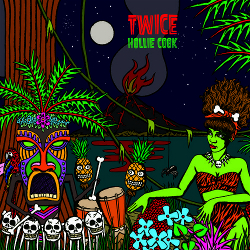Articles about reggae music, reviews, interviews, reports and more...
Hollie Cook - Twice

Hollie Cook - Twice
A risk-taking improvement on a winning formula.
Sampler
Last year when United Reggae came to interview Prince Fatty at his Ironworks studio in Brighton he played some near-finished songs from Hollie Cook’s then unreleased second album Twice.
 We were intrigued by the eponymous and very personal eulogy to Hollie’s friend and one time Slits band leader Ari Up, with its punk baiting Nile-Rodgers-meets-Sly-Dunbar disco-reggae-fusion beat and eerie choral intro asking “come let her fire blaze”. We were assured by the hard 80s Roots Radics vibes of trepidation love song Win or Lose.
We were intrigued by the eponymous and very personal eulogy to Hollie’s friend and one time Slits band leader Ari Up, with its punk baiting Nile-Rodgers-meets-Sly-Dunbar disco-reggae-fusion beat and eerie choral intro asking “come let her fire blaze”. We were assured by the hard 80s Roots Radics vibes of trepidation love song Win or Lose.
During the interview Fatty told us he was fighting label Mr Bongo for the use of an orchestra - a serious investment in these bedroom-production-to-download times. Now that the record is out you can hear he got his wish: because he has poured strings onto the 9 tracks giving them a haunting, filmic, global feel.
Strings used to be a controversial addition to reggae, stemming from Trojan’s early 70s practice of using them to sweeten certain productions (annoying hardcore fans whilst pleasing many artists who wanted to sound like their US soul heroes). However, a less trumpeted aspect of Jamaican music history is the influence of dark and moody orchestral film scores on the work of Don Drummond, Jackie Mittoo and Augustus Pablo. And here Fatty’s rhythms recapture some of that lavish but foreboding glory.
Reggae, symphonic soul and disco sounds of the 70s and the 80s are mashed together to create a chilled 90s ambient flavour similar to Nightmares on Wax. Check Postman’s weird and wonderful combination of Bollywood strings with tabla, steelpan and syn drum; Desdemona’s thickset 60s rocksteady guitars and dubwise Flexatone; or Looking For Real Love whose Aswad and Steel Pulse harmonies are put through a vocoder.
The preponderance of minor key backings suggests Hollie has been to darker places than before. And her fragile voice is much clearer in the mix with lyrics that seem more private, less cryptic and not so playfully cruel. The only letdowns are that deejay Horseman is strangely absent; and that Hollie and Fatty have not reconsidered their decision to exclude their Twinkle Brothers steppers cover of Kraftwerk’s the Model (which would have made an already strong set better by a scientific estimate of about 20%)
Hollie Cook’s debut was excellent from start to finish. But in keeping with Fatty’s reggae retro early productions it was a straight tribute to the roots and lovers rock era (lovers supremo Dennis Bovell is still in the band alongside Pioneers singer George Dekker and Twinkle bassist Dub Judah). Like Little Roy’s Nirvana album Twice is Fatty at his purist irking best: slamming vintage genres and eras against each other to fashion something new. It's a risk-taking improvement on a winning formula.
Read more about this topic
Comments actually desactivated due to too much spams
Browse by categories
Recommended Articles
Latest articles
Recently addedView all
© 2007-2026 United Reggae. All Rights Reserved. Reproduction in whole or in part is prohibited. Read about copyright
Terms of use | About us | Contact us | Authors | Newsletter | A-Z














